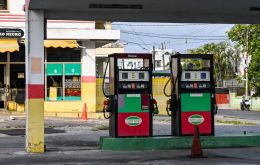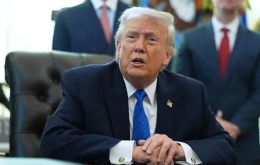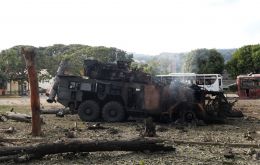MercoPress. South Atlantic News Agency
Tag: Cuba
-
Wednesday, February 18th 2026 - 12:04 UTC
Marco Rubio holds discreet contacts with Raúl Castro’s grandson, Axios reports

U.S. Secretary of State Marco Rubio has held discreet talks with Raúl Guillermo Rodríguez Castro, the grandson and caretaker of former Cuban leader Raúl Castro, bypassing official Cuban government channels, Axios reported, citing sources familiar with the outreach.
Add your comment! -
Saturday, February 14th 2026 - 04:19 UTC
Major fire hits Havana’s Ñico López refinery amid Cuba’s energy crunch

A large fire broke out on Friday at the Ñico López refinery in Cuba’s capital, sending a thick column of black smoke into the sky that was visible from multiple points around Havana Bay. Authorities have not yet disclosed the cause of the blaze or the extent of any damage, while emergency crews remained on scene.
1 comment -
Thursday, February 12th 2026 - 21:54 UTC
Chile announces humanitarian aid for Cuba as Boric condemns U.S. embargo

President Gabriel Boric’s government said on Thursday it will send humanitarian aid to Cuba, as the island faces a deepening economic and energy crisis.
Add your comment! -
Monday, February 9th 2026 - 08:20 UTC
Cuba tells airlines it will run out of jet fuel as of Monday, deepening energy crisis

Cuba has warned international airlines that it will run out of aviation fuel starting Monday, widening an energy emergency that has already disrupted transport, public services and economic activity — and now threatens to further squeeze tourism, one of the island’s main sources of hard currency.
-
Saturday, February 7th 2026 - 07:34 UTC
Fuel crunch halts Havana buses, squeezes hospitals and deepens Cuba’s power cuts

Cuba’s fuel shortage is rippling through daily life, with Havana’s urban bus network largely shut down, hospitals preparing to scale back non-urgent services, and longer planned blackouts announced in some areas—while social-media reports pointed to pots-and-pans protests in parts of the capital.
-
Monday, February 2nd 2026 - 09:54 UTC
US signals high-level Cuba contacts as energy pressure campaign widens

US President Donald Trump said his administration is talking with “the highest people” in Cuba and voiced confidence that a deal could be reached, even as Washington tightens economic pressure aimed at restricting the island’s fuel lifeline.
-
Friday, January 30th 2026 - 05:16 UTC
Trump threatens tariffs on countries supplying oil to Cuba, tightening pressure on Mexico

U.S. President Donald Trump signed an executive order that opens the door to imposing tariffs on imports from countries deemed to be supplying crude oil to Cuba, a move designed to raise the external cost of keeping Havana’s energy lifeline open and further constrain fuel flows to the island.
-
Monday, January 12th 2026 - 10:15 UTC
Maduro down, Trump aims at Cuba

US President Donald Trump has issued a total oil embargo and a diplomatic ultimatum to Cuba, signaling a Venezuela-style transition coming up. It was even rumored that US Secretary of State could be Cuba's next President.
-
Monday, January 5th 2026 - 10:15 UTC
Maduro's arrest leaves between 40 and 80 dead, including 32 Cubans

Speaking aboard Air Force One on Sunday, US President Donald Trump addressed the mounting death toll from the “Operation Absolute Resolve” raid in Caracas to abduct former Venezuelan leader Nicolás Maduro and outlined his administration’s new doctrine regarding ties with Latin American countries.
-
Monday, January 5th 2026 - 10:03 UTC
Attack on Venezuela was the first of many changes: Cuban government could be “ready to fall”

While former Venezuelan President Nicolás Maduro is held at the Metropolitan Detention Center (MDC) in Brooklyn, pending his arraignment at noon on Monday, Caracas' Supreme Court (TSJ) ordered Vice President Delcy Rodríguez to assume the role of Acting President to ensure “administrative continuity.”
